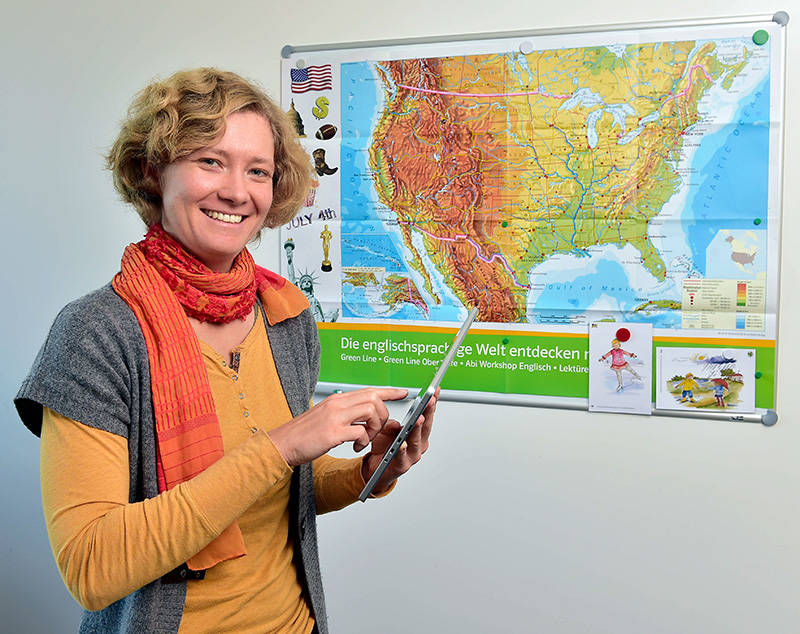In Two Scientific Homes
Eleven questions addressed to Jun.-Prof. Dr. Henriette Dausend, who holds the Junior Professorship in English Primary School Didactics since April 2014
-

Which are the advantages of using tablets in teaching English in primary schools - this is one of the questions, Jun.-Prof. Dr. Henriette Dausend is involved with. Photo: Sven Gleisberg
Jun.-Prof. Dr. Henriette Dausend (31) holds the Professorship for English Primary School Didactics at the Center for Teacher Education. In eleven answers, she gives the readers of “University News“ an insight into her career, goals and time in Chemnitz.
What do we actually understand under your professional discipline in English Primary School Didactics?
The main aim is to question how to implement a good English lesson in the primary school classroom. Therefore, research questions how school pupils learn languages and how teachers can arrange their lessons best. In seminars, students and prospective English teachers reflect the outcome of currently run research projects and plan learner- and active-oriented English lessons.
TU Chemnitz is for me as a junior professor the right choice, because…
…I found two academic homes. On the one hand, the newly founded Center for Teacher Education – the chance to work beyond the boundaries of my discipline jointly with didactics of other subjects. On the other hand, it is the warm welcome to the Department of English and American Studies which allows me to conduct research and teach in my subject area. Even people from outside the university show a high interest towards the return of teacher training programs in Chemnitz which provides many project opportunities with outsiders such as the New Saxon Gallery, the Schlingel Film Festival, schools, heads of departments and teachers from the region.
Could you say a few words about your academic career?
I worked as a research assistant in English Didactics and Literature at the University of Vechta lecturing and conducting research after having finished my Master of Education. During this time, I developed the research question of my dissertation which was: How can English lesson be designed that cater for the learner as a whole including his or her mother tongues. After study residences in Istanbul and Edinburgh, I finished my dissertation during my three-year activity period at the Chair of Professor Daniela Elsner at Goethe-Universität in Frankfurt am Main and published it in February 2014.
Describe your study time in no more than 15 words.
Good, exciting, colorful, entertaining, explanatory, questioning, textual, liberating, airy, crazy, embossing, playful, absolutely necessary!
Did you have role models during your studies who encouraged you to pursue a scientific career?
A great professor who overwhelmed us with scientific issues in his seminars. He was able to seed some incredible questions in my mind that I still carry with me and hope – at least in rudimentary form – to answer one day.
What advice would you give to young students and graduates?
Even if daily life mocks you and your graduation seems unachievable, stop, calm down and keep moving: All roads lead to Rome!
What would you like to achieve in teaching for the future?
I focus on enabling students to become qualified teachers who do skill-based and context-responsive teaching. My students are supposed to acquire skills to cope with scientific knowledge, to transform it to teaching and learning contexts and implement it into a teaching which covers the learners’ needs.
Which impact do you make in the research at TU Chemnitz?
Currently, there are three research projects running: The project "BILI 2015" explores the benefits of bilingual learners in the primary school in a longitudinal study since 2010. This project provides impetus for bilingual teaching schools in Saxony. Within the scope of the research project "MeLT – multiperspective learning with tablets", which was initiated in spring this year, the advantages of using tablets in teaching English in primary schools is tested. In the context of the question "In what ways can the spoke-productive and action-oriented competencies in English lesson be extended with the help of tablets?" teachers will be trained in dealing with tablets, planning and performing lessons and their teaching will be investigated using videography, interviews and diagnostic tests. In the project "Foundation of Multilingual Teaching" the attitudes of students with a migrant background are discovered in order to give information on how to include their native languages in teaching foreign languages best. The TU Chemnitz provides the opportunity to implement first results of all projects in teaching students first hand. Furthermore, there are smaller projects with colleagues from the Center for Teacher Education and the Department of English and American Studies planned which start soon.
There are around 45.000 professors at German universities. What sets you apart from others?
What distinguishes me? The focus on scientific questions in times of increasing efficiency in science; humility towards my job which is still a privilege for me; the leisure not to take each hurdle personally, but to see it sporty; my desire to ask questions and chase answers.
Which place do you show your guests the most in Chemnitz?
Sonnenberg, a part of Chemnitz which is no longer worth its bad reputation due to young peoples’ efforts including delicious vegan food, cozy cafés and a great hairdresser.
How do you play a part in the life of the city?
As a recipient of readings, museums and theaters, restaurants and cafés; supporting the Schlingel Film Festival; planning a multilingual Youth Museum; in projects with schools and teaching staff.
Further information about the Professorship at: https://www.tu-chemnitz.de/zlb/professuren/gsd_englisch/grundschuldidaktik_englisch.php
(Translation: Nataliia Boiko)
Katharina Thehos
10.11.2014




